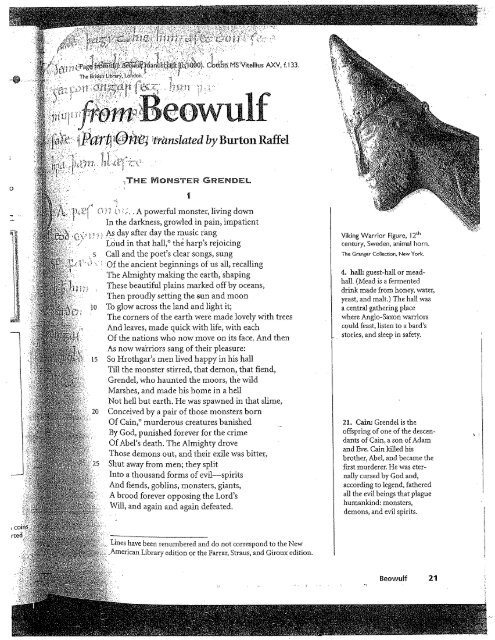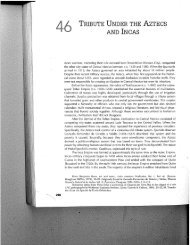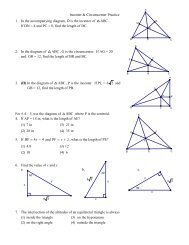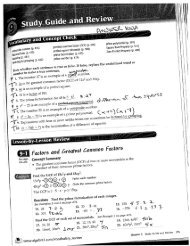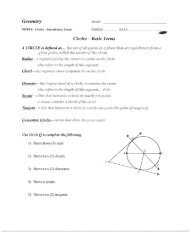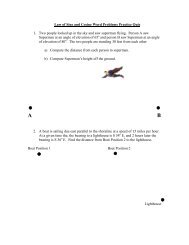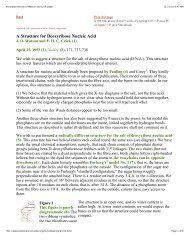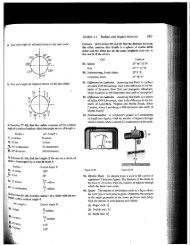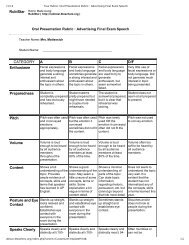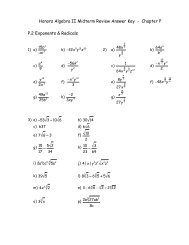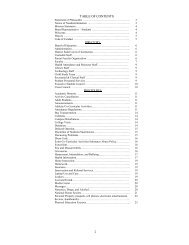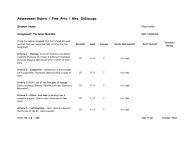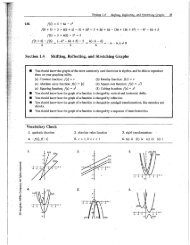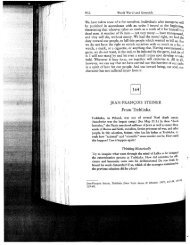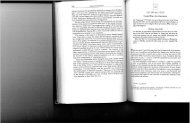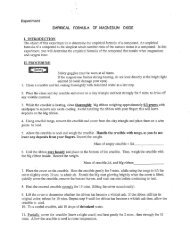Create successful ePaper yourself
Turn your PDF publications into a flip-book with our unique Google optimized e-Paper software.
D<br />
The<br />
<strong>it</strong>:<strong>ranslated</strong> <strong>by</strong> <strong>Burton</strong> <strong>Raffel</strong><br />
... A powerful monster, hwng down<br />
In the darkness, growled in pain, impatient<br />
4,~:.~~,~ ~r:, ~ ~ ~ day after day the music rhng<br />
L6ud in that hall, ° th~ harp’s rejoicing<br />
5 Call and the poet’s clear songs, sun S<br />
Of the ancient beginnings of us all, recalling<br />
The Almighty malting the earth, shaping<br />
These beautiful plains marked off <strong>by</strong> oceans,<br />
Then proudly setting the sun and moon<br />
i0 To slow across the land and light <strong>it</strong>;<br />
The corners of the earth were made lovely w<strong>it</strong>h trees<br />
And leaves, made quick w<strong>it</strong>h life, w<strong>it</strong>h each<br />
Of the nations who now move on <strong>it</strong>s face. And then<br />
As now wakriors sang of their pleasure:<br />
!5 So Hrothgar’s men lived happy in his hall<br />
Till the monster stirred, that demon, that fiend,<br />
Grendel, who haunted the moors, th~ wild<br />
Marshes, and made his home in a hell<br />
Not hell but earth. He was spawned in that slime,<br />
Conceived <strong>by</strong> a pair of those monsters born<br />
Of Cain, ° murderous creatures banished .<br />
By God, punished forever for the crime<br />
Of Abel’s death. The Almighty drove<br />
Those demons out, and their exile was b<strong>it</strong>ter,<br />
Shut away from men; they spl<strong>it</strong><br />
Into a thousand forms of evil--spir<strong>it</strong>s<br />
And fiends, goblins, monsters, giants,<br />
A brood forever opposing the Lord’s<br />
Will, and again and again defeated.<br />
: been renumbered and do not correspond to the New<br />
.American Library ed<strong>it</strong>ion or the Farrar, Straus, and Giroux ed<strong>it</strong>ion.<br />
Viking Warrior Figure, 12 th<br />
century, Sweden, animal horn.<br />
4. hall: guest-hall or meadhail.<br />
(Mead is a fermented<br />
drink made from honey, water,<br />
yeast, and malt.) The hall was<br />
a central gathering place<br />
where Anglo-Saxon warriors<br />
could feast, listen to a bard’s<br />
stories, and sleep in safety.<br />
21. Cain: Grendel is the<br />
offspring of one of the descendants<br />
of Cain, a son of Adam<br />
and Eve. Cain killed his<br />
brother, Abel, and became the<br />
first murderer. He was eternally<br />
cursed <strong>by</strong> God and,<br />
according to legend, fathered<br />
all the evil beings that plague<br />
humankind: monsters,<br />
demons, and evi! spir<strong>it</strong>s.<br />
Beowulf 21
3O Then, when darkness had dropped, Grendel<br />
Went up to Herot, wondering what the warriors<br />
Would do in that hall when their drinking was done.<br />
He found them sprawled in sleep, suspecting<br />
Nothing, their dreams undisturbed. The monster’s<br />
35 Thoughts were as quick as his greed or his claws:<br />
He slipped through the door and there in the silence<br />
Snatched up thirty men, smashed them<br />
Unknowing in their beds, and ran out w<strong>it</strong>h their bodies,<br />
The blood dripping behind him, back<br />
4O To his lair, delighted w<strong>it</strong>h his night’s slaughter.<br />
At daybreak, w<strong>it</strong>h the sun’s first light, they saw<br />
How well he had worked, and in that gray morning<br />
Broke their long feast w<strong>it</strong>h tears and laments<br />
For the dead. Hrothgar, their lord, sat joyless<br />
45 In Herot, a mighty prince mourning<br />
The fate of his lost friends and companions,<br />
Knowing <strong>by</strong> <strong>it</strong>s tracks that some demon had torn<br />
His followers apart. He wept, fearing<br />
The beginning might not be the end. And that night<br />
50 Grende! came again, so set<br />
On murder that no crime could ever be enough,<br />
No savage assault quench his lust<br />
For evil. Then each warrior tried<br />
To escape him, searched for rest in different<br />
55 Beds, as far from Herot as they could find,<br />
Seeing how Grendel hunted when they slept.<br />
Distance was safety; the only survivors<br />
Were those who fled him. Hate had triumphed.<br />
So Grendel ruled, fought w<strong>it</strong>h the righteous,<br />
60 One against many, and won; so Herot<br />
Stood empty, and stayed deserted for years,<br />
Twelve winters of grief for Hrothgar, king<br />
Of the Danes, sorrow heaped at his door<br />
By hell-forged hands. His misery leaped<br />
65 The seas, was told and sung in all<br />
Men’s ears: how Grende!’s hatred began,<br />
How the monster relished his savage war<br />
On the Danes, keeping the bloody feud<br />
Alive, seeking no peace, offering<br />
70 No truce, accepting no settlement, no price<br />
In gold or land, and paying the living<br />
For one crime only w<strong>it</strong>h another. No one<br />
Wa<strong>it</strong>ed for reparation ° from his plundering claws:<br />
That shadow of death hunted in the darkness,<br />
22 ~ The Anglo-Saxons<br />
Helmet (iron), from Sweden <strong>by</strong><br />
Viking, (9 th century).<br />
[] 53-58. ,Why do none of<br />
Hrothgar s men challenge<br />
Grende!?<br />
~<br />
~ Ig~ Grendels<br />
S9~64;<br />
reign<br />
How long<br />
of terror<br />
has<br />
lasted?<br />
73. reparation (rep’~.ra’sh~n)<br />
n.: payment to compensate for<br />
wrongdoing.
7s Stalked H~othgar’s warriors, old<br />
And young, lying in wa<strong>it</strong>ing, hidden<br />
In mist, invisiloly following them from the edge<br />
Of the marsh, always there, unseen.<br />
So mankind’s enemy continued his crimes,<br />
80 Killing as often as he could, coming<br />
Alone, bloodthirsty and horrible. Though he lived<br />
In Herot, when the night hid him, he never<br />
Dared to touch king Hrothgar’s glorious<br />
Throne, protected <strong>by</strong> God--God,<br />
8s Whose love Grendel could not know. But Hrothgar’s<br />
Heart was bent. The best and most noble<br />
Of his council debated remedies, sat<br />
In secret sessions, talking of terror<br />
And wondering what the bravest of warriors could do.<br />
90 And sometimes they sacrificed to the old stone gods,<br />
Made heathen vows, hoping for Hell’s<br />
Support, the Devil’s guidance in driving<br />
Their affliction off. That was their way,<br />
And the heathen’s only hope, Hell<br />
95 Always in their hearts, knowing ne<strong>it</strong>her God<br />
Nor His passing as He walks through our world, the Lord<br />
Of Heaven and earth; their ears could not hear<br />
His praise nor know His glory. Let them<br />
Beware, those who are thrust into danger,<br />
i00 Clutched at <strong>by</strong> trouble, yet can carry no solace °<br />
In their hearts, cannot hope to be better! Hail<br />
To those who Will rise to God, drop off<br />
Their dead bodies, and seek our Father’s peace!<br />
105<br />
So the living sorrow of Healfdane’s son °<br />
Simmered, b<strong>it</strong>ter and fresh, and no wisdom<br />
Or strength could break <strong>it</strong>: That agony hung<br />
On king and people alike, harsh<br />
And unending, violent and cruel, and evil.<br />
In his far-off home Beowulf, Higlac’s<br />
Follower ° and the strongest of the Geats--greater<br />
And stronger than anyone anywhere in this world--<br />
Heard how Grendel filled nights w<strong>it</strong>h horror<br />
And quickly commanded a boat f<strong>it</strong>ted out,<br />
that he’d go to that famous king,<br />
Would sail across the sea to Hrothgar,<br />
Now when ) was needed. None<br />
wse retted his going, much<br />
abo~ Grehdel an~ Hrothga? iO<br />
100. solace (sN’is) n.: peace.<br />
104. Healfdane’s son:<br />
Hrothgar.<br />
110. Higlac’s follower: Higlac<br />
is Beowulf’s uncle and feudal<br />
lord.<br />
NN q~ql<strong>it</strong>ies of ~l?~ e~!c b~r o<br />
Beowulf 23
120<br />
As he was loved <strong>by</strong> the Geats: The omens were good,<br />
And they urged the adventure on. So Beowulf<br />
Chose the mightiest men he could find,<br />
The bravest and best of the Geats, fourteen<br />
In all, and,led them down to their boat;<br />
He knew the sea, would point the prow °<br />
Straight to that distant Danish shore ....<br />
Beowulf arrives in Denmark and is directed to Herot, the<br />
mead-hall of King Hrothgar. The king sends Wulfgar, one of<br />
his thanes (or feudal lords), to greet ¢fie ~is<strong>it</strong>ors.<br />
125 . .. Then Wulfgar went to the door and addressed<br />
The wa<strong>it</strong>ing seafarers w<strong>it</strong>h soldier’s words:<br />
’°My lord, the great king of the Danes, commands me<br />
To tell you that he knows of your noble birth<br />
And that having come to him from over the open<br />
130 Sea you have come bravely and are welcome.<br />
Now go to him as you are, in your armor and helmets,<br />
But leave your battle-shields here, and your spears,<br />
Let them lie wa<strong>it</strong>ing for the promises your words<br />
May make."<br />
Beowulf arose, w<strong>it</strong>h his men<br />
135 Around him, ordering a few to remain<br />
W<strong>it</strong>h their weapons, leading the others quicldy<br />
Along under Herot’s steep roof into Hrothgar’s<br />
Presence. Standing on that prince’s own hearth,<br />
Helmeted, the silvery meta! of his mail shirt °<br />
!40 Gleaming w<strong>it</strong>h a sm<strong>it</strong>h’s ° high art, he greeted<br />
The Danes’ great lord:<br />
"Hail, Hrothgar!<br />
Higtac is my cousin ° and my king; the days<br />
Of my youth have been filled w<strong>it</strong>h glory. Now Grendel’s<br />
Name has echoed in our land: Sailors<br />
t45 Have brought us stories of Herot, the best<br />
Of all mead-halls, deserted and useless when the moon<br />
Hangs in skies the sun had l<strong>it</strong>,<br />
Light and life fleeing together.<br />
My people have said, the wisest, most knowing<br />
150 And best.of them, that my duty was to go to the Danes’<br />
Great king. They have seen my strength for themselves,<br />
Have watched me rise fi’om the darkness of war,<br />
Dripping w<strong>it</strong>h my enemies’ blood. I drove<br />
24- ~ The Anglo-Saxons<br />
123. prow (pro~): front part<br />
of a boat.<br />
139. mail shirt: armored<br />
garment made of interlocking<br />
metal rings.<br />
140. sm<strong>it</strong>h’s: metalworker’s.<br />
142. cousin: any relative.
Five great giar~ts into chains, chased<br />
155 All of that race from the earth. I swam<br />
In the blackness of night, hunting monsters ’<br />
Out of the ocean, and frilling them one<br />
By one; death was my errand and the fate<br />
They had earned. Now Grendel and I are called<br />
160 Together;and Fve come: Grant me;then, .....<br />
Lord and protector of this noble place,<br />
A single request! I have come so fat-,<br />
Oh shelterer of warriors and your people’s loved friend,<br />
That this one favor you should not refuse me--<br />
165 That I, alone and w<strong>it</strong>h the help of my men,<br />
May purge all evil from this hall. I have heard,<br />
Too, that the monster’s scorn of men<br />
Is so great that he needs no weapons and fears none.<br />
Nor will I. My lord Higlac<br />
170 Might think less of me if I let my sword<br />
Go where my feet were afraid to, if I hid<br />
Behind some broad linden shMd: ° My hands<br />
Alone shall fight for me, struggle for life<br />
Against the monster. God must decide<br />
Who will be given to death’s cold grip.<br />
Grendel’s plan, I think, will be<br />
What <strong>it</strong> has been before, to invade this hall<br />
And gorge his belly w<strong>it</strong>h our bodies. If he can,<br />
If he can. And I think, if my time will have come,<br />
180 There’l! be nothing to mourn over, no corpse to prepare<br />
For <strong>it</strong>s grave: Grendel will carry our bloody<br />
Flesh to the moors, crunch on our bones,<br />
And smear torn scraps of our skin on the walls<br />
Of his den. No, I expect no Danes<br />
. 185 Will fret about sewing our shrouds, ° if he wins.<br />
And if death does take me, send the hammered<br />
Mail of my armor to Higlac, return<br />
The inher<strong>it</strong>ance I had from Hrethel, ° and he<br />
From Waytand. ° Fate will unwind as <strong>it</strong> must!"<br />
Hrothgar replied, protector of the Danes:<br />
"Beowulf, you’ve come to us in friendship, and because<br />
Of the reception your father found at our court.<br />
gun a b<strong>it</strong>ter feud,<br />
Hathlaf, a Wulfing warrior: °<br />
Your father’s countrymen were afraid of war,<br />
If he returned to his home, and they turned him away.<br />
172, linden shield: shield<br />
made from wood of the linden<br />
tree.<br />
185. shrnuds: cloths used to<br />
wrap a body for burial.<br />
188. Hrethel: Beowulf’s<br />
grandfather, former king of<br />
the Geats,<br />
189, Wayland: a sm<strong>it</strong>h celebrated<br />
for his skill in making<br />
swords and mail shirts.<br />
194. Wulfingwarrior: The<br />
Wulfings were a Germanic<br />
tribe. Hrothgar’s queen might<br />
have been a Wulfing.<br />
Beowulf 25<br />
’l
26<br />
2o0<br />
Then he traveled across the curving waves<br />
To the land of the Danes. I was new to the throne,<br />
Then, a young man ruling this wide<br />
Kingdom and <strong>it</strong>s golden c<strong>it</strong>y: Hergar,<br />
My older brother, a far better man ............................<br />
~ 191-207. Whatdoyou<br />
think causes Hrothgar to<br />
make this Speech, reminding<br />
2o5<br />
Than I, had died and dying made me,<br />
Second among Healfdane’s sons, first<br />
In this nation. I bought the end of Edgetho’s<br />
Quarrel, sent ancient treasures through the ocean’s<br />
Furrows to the Wulfings; your father SWore<br />
He’d keep that peace. My tongue grows heaw,<br />
And my heart, When I try to tel! you what Grende!<br />
Beowulf of t1~ e time I~g~elped<br />
Beowulf’s father?What is the<br />
probable effect of these words<br />
on Beowulf?.<br />
210<br />
Has brought us, the damage he s done, here<br />
In this hall. You see for yourself how much smaller<br />
Our ranks have become, and can guess What we’ve lost<br />
To his terror. Surely the Lord Almighty<br />
Could stop his madness, smother his lust!<br />
How many times have my men, g/owing<br />
2!5 W<strong>it</strong>h Courage drawn from too many cups<br />
Of ale, SWorn to stay after dark<br />
And stem that horror w<strong>it</strong>h a sweep of their SWords.<br />
And then, in the morning, this mead-hall.gl<strong>it</strong>tering<br />
W<strong>it</strong>h new light would be drenched w<strong>it</strong>h blood, the benches<br />
220 Stained red, the floors, all wet from that fiend’s<br />
Savage assault--and my soldiers would be fewer<br />
225<br />
Still, death taking more and more.<br />
But to table, Beowulf, a banquet in your honor:<br />
Let us toast your victories, and talk of the future."<br />
Then Hrothgar’s men gave places to the Geats,<br />
Yielded benches to the brave vis<strong>it</strong>ors,<br />
And led them to the feast. The keeper of the mead<br />
230<br />
Came carrying out the carved flasks,<br />
And poured that bright Sweetness. A poet<br />
Sang, from time to time, in a clear<br />
P~re voice. Danes and vis<strong>it</strong>ing Geats<br />
Celebrated as one, drank and rejoiced.<br />
Page from the Beowug<br />
manuscript (c. 1000). Cotton<br />
MS V<strong>it</strong>ellius AXV, f.133,<br />
235<br />
Unferth spoke, Ecglaf’s son,<br />
Who sat at Hroth-ar ....<br />
And Sharp (vexed<br />
8 s wet, spoke harsl~ly<br />
° <strong>by</strong> Beowulf’s adventure,<br />
By their vis<strong>it</strong>or’s courage, and angry that anyone<br />
In Denmark or anywhere on earth had ever<br />
The Anglo-Saxons<br />
235. vexed (vekst):highly<br />
annoyed.
Acquired glory and fame greater<br />
Than his own):<br />
’~You’re Beowulf, are you--the same<br />
240 Boastful fool who fought a swimming<br />
Match w<strong>it</strong>h Brecca, both of you daring<br />
........ And-young and proud, exp!oring the deepest<br />
Seas, risking your lives for no reason<br />
But the danger? All older and wiser heads warned you<br />
245 Not to, but no one could check such pride.<br />
w<strong>it</strong>h Brecca at your side you swam along<br />
The sea-paths, your swift-moving hands pulling you<br />
Over the ocean’s face. Then winter<br />
Churned through the water, the waves ran you<br />
250 As they willed, and you struggled seven long nights<br />
To survive. And at the end victory was his,<br />
Not yours. The sea carried him close<br />
To his home, to southern Norway, near<br />
The land of the Brondings, where he ruled and was loved,<br />
255 Where his treasure was piled and his strength protected<br />
His towns and his people. He’d promised to outswim you:<br />
Bonstan’s son ° made that boast ring true.<br />
You’ve been lucky in your battles, Beowulf, but I think<br />
Your luck may change if you challenge Grendel,<br />
260 Staying a whole night through in this hall,<br />
Wa<strong>it</strong>ing where that fiercest of demons can find you:’<br />
Beowulf answered, Edgetho’s great son:<br />
"Ah! Unferth, my friend, your face<br />
Is hot w<strong>it</strong>h ale, and your tongue has tried<br />
265 To tell us about Brecca’s doings. But the truth<br />
Is simple: No man swims in the sea<br />
As I can, no strength is a match for mine.<br />
As boys, Brecca and I had boasted--<br />
We were both too young to know better--that we’d risk<br />
270 Our lives far out at sea, and so<br />
We did. Each of us carried a naked<br />
Sword, prepared for whales or the swift<br />
Sharp teeth and beaks of needlefish.<br />
He could never leave me behind, swim faster<br />
27s Across the waves than I could, and I<br />
Had chosen to remain close to his side.<br />
I remained near him for five long nights,<br />
Until a flood swept us apart;<br />
The frozen sea surged around me,<br />
It grew dark, the wind turned b<strong>it</strong>ter, blowing<br />
From the north, and the waves were savage. Creatures<br />
Who sleep deep in the sea were stirred<br />
Into life--and the iron hammered links<br />
~ 239-252. Why might<br />
~ Unferth think that Beowulf<br />
is ashamed of having taken<br />
part in the swimming race?<br />
257. Bonstan’s son: Brecca.<br />
D 274-2~6. What is<br />
Beowulf s explanation for<br />
not leaving Brecca far behind?<br />
27
Of my mai! shirt, these shining b<strong>it</strong>s of metal<br />
285 Woven across my breast, saved me<br />
From death. A monster seized me, drew me<br />
SW!(f! Y toward the bottom, swimming w<strong>it</strong>h <strong>it</strong>s claws<br />
Tight in my flesh. But fate let me<br />
Find <strong>it</strong>s heart w<strong>it</strong>h my sword, hack myself<br />
Free; I fought that beast’s last battle,<br />
Left <strong>it</strong> floating lifeless in the sea.<br />
"Other monsters crowded around me,<br />
Continually attacking. I treated them pol<strong>it</strong>ely,<br />
Offering the edge of my razor-sharp sword.<br />
But the feast, I think, did not please them, filled<br />
Their evil bellies w<strong>it</strong>h no banquet-rich food,<br />
Thrashing there at the bottom of the sea;<br />
By morning they’d decided to sleep on the shore,<br />
Lying on their backs, their blood spilled out<br />
3oo On the sand. Afterwards, sailors could cross<br />
That sea-road and fee! no fear; nothing<br />
Would stop their passing. Then God’s bright beacon<br />
Appeared in the east, the water lay still,<br />
And at last I could see the land, wind-swept<br />
3o5 Cliff-walls at the edge of the coast. Fate saves<br />
The living when they drive away death <strong>by</strong> themselves!<br />
Lucky or not, nine was the number<br />
Of sea-huge monsters I killed. What man,<br />
Anywhere under Heaven’s high arch, has fought<br />
In such darkness, endured more misery, or been harder<br />
Pressed? Yet I survived the sea, smashed<br />
The monsters’ hot iaws, swam home from my ~ourney.<br />
The swift-flowing waters swept me along<br />
And I landed on Finnish soil. I’ve heard<br />
No tales of you, Unferth, telling<br />
Of such clashing terror, such contests in the nightl g reccas ’ battles were never so bold;<br />
"<br />
Ne<strong>it</strong>her he nor you can match me--and I mean<br />
No boast, have announced no more than I know<br />
320 To be true. And there’s more: You murdered your brothers,<br />
Your own close kin. Words and bright w<strong>it</strong><br />
Won’t help your soul; you’ll suffer bell’s fires,<br />
Unferth, forever tormented. Ecglaf’s<br />
Proud son, if your hands were as hard, your heart<br />
325 As fierce as you think <strong>it</strong>, no fool would dare<br />
Td raid your hall, ruin Hero?<br />
28 ~ The Anglo-Saxons<br />
SUttOn HOO Bowl (7 th century),<br />
Sutton Hoo ship burial.<br />
Byzantine silver bowl.<br />
~ 323-3~4. Whatis<br />
Beowulf s final response to<br />
U nferths ’ challenge?
........ And oppress <strong>it</strong>s prince, as Grendel has done.<br />
But he’s learned that terror is his alone,<br />
Discovered he can come for your people w<strong>it</strong>h no fear<br />
Of reprisal; ° he’s found no fighting, here,<br />
But only food, only delight.<br />
He murders as he likes, w<strong>it</strong>h no mercy, gorges<br />
And feasts on your flesh, and expects no trouble,<br />
........... No-quarre!: from the quiet Danes. Now ............................<br />
335 The Geats will show him courage, soon<br />
He can test his strength in battle. And when the sun<br />
Comes up again, opening another<br />
Bright day from the south, anyone in Denmark<br />
May enter this hall: That evil w<strong>it</strong>l be gon .<br />
340 Hrothgar, gray-haired and brave, sat happily<br />
Listening, the famous ring-giver sure,<br />
At last, that Grendel could be killed; he believed<br />
In Beowulf’s bold strength and the firmness of his spir<strong>it</strong>.<br />
There was the sound of laughter, and the cheerful clanking<br />
345 Of cups, and pleasant words. Then Welthow,<br />
Hrothgar’s gold-ringed queen, greeted<br />
The warriors; a noble woman who knew<br />
What was right, she raised a flowing cup<br />
To Hrothgar first, holding <strong>it</strong> high<br />
350 For the lord of the Danes to drink, wishing him<br />
Joy in that feast. The famous king<br />
Drank w<strong>it</strong>h pleasure and blessed their banquet.<br />
Then Welthow went from warrior to warrior,<br />
Pouring a portion from the jeweled cup<br />
355 For each, till the bracelet-wearing queen<br />
Had carried the mead-cup among them and <strong>it</strong> was Beowulf’s<br />
330. reprisal (ri.pri’z~I) n.:<br />
punishment in return for an<br />
injury.<br />
Purse lid, from the Sutton Hoo<br />
Ship Burial (c.625-30 A.D.).<br />
Gold, garnets and millefiori<br />
glass.<br />
29
Turn to be served. She saluted the Gears’<br />
Great prince, thanked God for answering her prayers,<br />
For allowing her hands the happy duty<br />
36o Of offering mead to a hero who would help<br />
Her afflicted people. He drank what she poured ............<br />
Edge~tibYb~id ~0i~ th~)~ assured the Danish<br />
Queen that his heart was firm and his hands<br />
Ready: "When we crossed the sea, my comrades<br />
365 And I, I already knew that all<br />
My purpose was this: to win the good will<br />
Of your people or die in battle, pressed<br />
In Grendel’s fiercq grip. Let me live in greatness<br />
And courage, or here in this hall welcome<br />
My death!"<br />
370 Welthow was pleased w<strong>it</strong>h his words,<br />
His bright-tongued boasts; she carried them back<br />
To her lord, walked nobly across to his side.<br />
The feast went o~, laughter and nmsic<br />
And the brave words of warriors celebrating<br />
375 Their delight. Then Hrothgar rose, Healfdane’s<br />
Son, heavy w<strong>it</strong>h sleep; as soon<br />
As the sun had gone, he knew that Grandel<br />
Would come to Herot, would vis<strong>it</strong> that hall<br />
When night had covered the earth w<strong>it</strong>h <strong>it</strong>s net<br />
38o And the shapes of darkness moved black and silent<br />
Through the world. Hrothgar’s warriors rose w<strong>it</strong>h him.<br />
He went to Beowulf, embraced the Geats’<br />
Brave prince, wished him well, and hoped<br />
That Herot would be his to command. And then<br />
He declared:<br />
385 "No one strange to this land<br />
Has ever been granted what I’ve given you,<br />
No one in all the years of my rule.<br />
Make this best of all mead-halls yours, and then<br />
Keep <strong>it</strong> free of evil, fight<br />
W<strong>it</strong>h glory in your heart! Purge Herot<br />
And your ship will sail home w<strong>it</strong>h <strong>it</strong>s treasure-holds full."...<br />
~ The Anglo-Saxons<br />
364-3.69. Whatdoes<br />
~ Beowulf s speech here<br />
reveal about his ct~aracter?<br />
Saxon brooch discovered at<br />
N<strong>it</strong>cham, South kondon (earl)"<br />
6 th century). Gold leaf on<br />
wood. English School.<br />
© Museum of Lon~o~, UK.
395<br />
The f~ast ends. Beowulf and his men take the place of<br />
Hrothgar’s followers and lie down to sleep in Herot.<br />
Beowulf, however, is wakeful, eager to meet his enemy.<br />
Out from the marsh, from the foot of misty<br />
Hills and bogs, bearing God’s hatred,<br />
Grendel came, hoping to kill<br />
Anyone he could trap on this trip to high Herot.<br />
He moved quicldy thro~igh the cloudy night,<br />
Up from his swampland, sliding silently<br />
Toward that gold-shining hall. He had vis<strong>it</strong>ed Hrothgar’s<br />
Home before, knew the way--<br />
Animal head from a<br />
Viking ship (c. 800).<br />
31
400 But never, before nor after that night,<br />
Found Herot defended so firmly, his reception<br />
So harsh. He journeyed, forever joyless,<br />
Straight to the door, then snapped <strong>it</strong> open,<br />
Tore <strong>it</strong>s iron fasteners w<strong>it</strong>h a touch,<br />
405 And rushed angrily over the threshold.<br />
He strode quickly across the inlaid<br />
Floor, snarling and fierce: His eyes<br />
Gleamed in the darkness, burned w<strong>it</strong>h a gruesome<br />
Light. Then he stopped, seeing the hall<br />
410 Crowded w<strong>it</strong>h sleeping warriors, stuffed<br />
W<strong>it</strong>h rows of young soldiers resting together.<br />
And his heart laughed, he relished the sight,<br />
Intended to tear the life from those bodies<br />
By morning; the monster’s mind was hot<br />
415 W<strong>it</strong>h the thought of food and the feasting his belly<br />
Would soon know. But fate, that night, intended<br />
Grendel to gnaw the broken bones<br />
Of his last human supper. Human<br />
Eyes were watching his evil steps,<br />
420 Wa<strong>it</strong>ing to see his s~ift hard claws.<br />
Grendel snatched at the first Geat<br />
He came to, ripped him apart, cut<br />
His body to b<strong>it</strong>s w<strong>it</strong>h powerful jaws,<br />
Drank the blood from his veins, and bolted<br />
425 Him down, hands and feet; death<br />
And Grendel’s great teeth came together,<br />
Snapping life shut. Then he stepped to another<br />
Still body, clutched at Beowulf w<strong>it</strong>h his claws,<br />
Grasped at a strong-hearted wakeful sleeper<br />
--And was instantly seized himself, claws<br />
Bent back as Beowulf leaned up on one arm.<br />
That shepherd of evil, guardian of crime,<br />
Knew at once that nowhere on earth<br />
Had he met a man whose hands were harder;<br />
435 His mind was flooded w<strong>it</strong>h fear--but nothing<br />
Coald take his talons and himself from that tight<br />
Hard grip. Grendel’s one thought was to run<br />
From BeowuIf, flee back to his marsh and hide there:<br />
This was a different Herot than the hall he had emptied.<br />
440 But Higlac’s follower remembered his final<br />
Boast ands. standing erect, stopped<br />
The monster’s flight, fastened those daws<br />
In his fists til! they cracked, clutched Grendel<br />
Closer. The infamous killer fought<br />
445 For his freedom, wanting no flesh but retreat,<br />
Desiring nothing but escape; his daws<br />
32 ~ The Anglo-Saxons<br />
Dragonhead fl’om aViking<br />
horse collar (detail) (lOth<br />
century). Denmark.<br />
416-418. These ~ines .<br />
foreshadow, or hint at, the<br />
outcome of the battle<br />
between Grendel and<br />
Beowulf.<br />
~ Grendel has been attack.<br />
~ ing Herot successfully for<br />
years. What will be different<br />
about this vis<strong>it</strong> to Herot?<br />
435,-447. "Higlac’s<br />
follower" is Beowulf. He had<br />
earlier sworn to kill Grendel<br />
w<strong>it</strong>h his bare hands.<br />
[]What details in these<br />
lines demonstrate<br />
Beowulf’s superhuman<br />
strength?
Had been caught, he was trapped. That trip to Herot<br />
~£s d miserable journey for the wr<strong>it</strong>hing monster!<br />
The high hall rang, <strong>it</strong>s roof boards swayed,<br />
450 And Danes shook w<strong>it</strong>h terror. Down<br />
The aisles the battle swept, angry<br />
And wild. Herot trembled, wonderfully<br />
Bulk to w<strong>it</strong>hstand the blows, the struggling<br />
Great bodies beating at <strong>it</strong>s beautiful walls; .............<br />
455 Shaped and fastened w<strong>it</strong>h iron, inside<br />
And out, artfully worked, the building<br />
Stood firm. Its benches rattled, fell<br />
To the floor, gold-covered boards grating<br />
As Grendel and Beowulf battled across them.<br />
460 Hrothgar’s wise men had fashioned Herot<br />
To stand forever; only fire,<br />
They had planned, cou.ld shatter what such skill had put<br />
Together, swallow in hot flames such splendor<br />
Of ivory and iron and wood. Suddenly<br />
465 The sounds changed, the Danes started<br />
In new terror, cowering in their beds as the terrible<br />
Screams of the Almighty’s enemy sang<br />
In the darkness, the horrible shrieks of pain<br />
And defeat, the tears torn out of Grendel’s<br />
47o Taut throat, bell’s captive caught in the arms<br />
Of him who of all the men on earth<br />
Was the strongest.<br />
9<br />
That mighty protector of men<br />
Meant to hold the monster till <strong>it</strong>s life<br />
Leaped out, knowing the fiend was no use<br />
475 To anyone in Denmark. All of Beowulf’s<br />
Band had jumped from their beds, ancestral<br />
Swords raised and ready, determined<br />
To protect their prince if they could. Their courage<br />
Was great but all wasted: They could hack at Grendel<br />
480 From every side, trying to open<br />
A path for his evil soul, but their points<br />
Could not hurt him, the sharpest and hardest iron<br />
Could not scratch at his skin, for that sin-stained demon<br />
Had bew<strong>it</strong>ched all men’s weapons, laid spells<br />
48s That blunted every mortal man’s blade.<br />
And yet his time had come, his days<br />
Were over, his death near; down<br />
rib hell he would go, swept groaning and helpless<br />
To the wa<strong>it</strong>ing hands of still worse fiends.<br />
Eagle shield ornament<br />
(Tth century), from<br />
the Sutton Hoo ship<br />
treasure, Suffolk, England.<br />
467-472. Earlier in the<br />
~<br />
epic <strong>it</strong> was explained that<br />
Grendel is a descendant of<br />
Cain, who was cursed <strong>by</strong> God.<br />
In what ways is this battle between<br />
Grendel and Beowulf reairy<br />
a battle be~een good and<br />
evil? What details in the de<br />
scription of the battle make<br />
this clear?<br />
[] 479-485. According to<br />
these lines, why can t<br />
Beowulf’s men harm Grendel?<br />
Beowulf 33
490<br />
495<br />
50O<br />
505<br />
510<br />
515<br />
Now he discovered--once the afflictor<br />
Of men, tormentor of their days--what <strong>it</strong> meant<br />
To feud w<strong>it</strong>h Almighty God: Grendel<br />
Saw that his strength was deserting him, his claws<br />
Bound fast, Higlac’s brave follower tearing at<br />
His bands. The monster’s hatred rose higher,<br />
But his power had gone. He twisted in pain,<br />
And the bleeding sinews deep in his shoulder .................<br />
Snapped, muscle and bone spl<strong>it</strong><br />
And broke. The battle was over, Beowulf<br />
Had been granted new glory: Grendel escaped,<br />
But wounded as he was could flee to his den,<br />
His miserable hole at the bottom of the marsh,<br />
Only to die, to wa<strong>it</strong> for the end<br />
Of all his days. And after that bloody<br />
Combat the Danes laughed w<strong>it</strong>h delight.<br />
He who had come to them from across the sea,<br />
Bold and strong-minded, had driven affliction<br />
Off, purged Herot clean. He was happy,<br />
Now, w<strong>it</strong>h that night’s fierce work; the Danes<br />
Had been served as he’d boasted he’d serve them; Beowulf,<br />
A prince of the Geats, had killed Grendel,<br />
Ended the grief, the sorrow, the suffering<br />
Forced on Hrothgar’s helpless people<br />
By a bloodthirsty fiend. No Dane doubted<br />
The victory, for the proof, hanging high<br />
From the rafters where Beowulf had hung <strong>it</strong>, was the monster’s<br />
Arm, claw and shoulder and all.<br />
And then, in the morning, crowds surrounded<br />
Herot, warriors coming to that hall<br />
52o From faraway lands, princes and leaders<br />
Of men hurrying to behold the monster’s<br />
Great staggering tracks. They gaped w<strong>it</strong>h no sense<br />
Of sorrow, felt no regret for his suffering,<br />
Went tracing his bloody footprints, his beaten<br />
525 And lonely flight, to the edge of the lake<br />
Where he’d dragged his corpselike way, doomed<br />
And already weary of his vanishing life.<br />
The water’was bloody, steaming and boiling<br />
In horrible pounding waves, heat<br />
53o Sucked from his magic veins; but the swirling<br />
Surf had covered his death, hidden<br />
Deep in murky darkness his miserable<br />
End, as hell opened to receive him.<br />
34 ~ The Anglo-Saxons<br />
Detail of three-ringed gold collar<br />
(6th century).<br />
~ 490-499. Howdees<br />
Beowulf defeat Grendel?<br />
514-517. Ho~’does<br />
[]<br />
Beowulf prove his victory<br />
over GrendeP Why might he<br />
do this?<br />
~~<br />
522-533. What has<br />
happened to Grendel?
535<br />
540<br />
Then old and young rejoiced, turned back<br />
From that happy pilgrimage, mounted their hard-hooved<br />
Horses, high-spir<strong>it</strong>ed stallions, and rode them<br />
Slowly toward Herot again, retelling<br />
Beowulf’s bravery as they jogged along.<br />
And over and over they swore that nowhere<br />
On earth or ~inder th~ @readifig sky ......<br />
Or between the seas, ne<strong>it</strong>her south nor north,<br />
Was there a warrior worthier to rule over men.<br />
(But no one meant Beowulf’s praise to bel<strong>it</strong>tle<br />
Hrothgar, their kind and gracious king!) ...<br />
Grendel’s monstrous mother, in grief for her son, next atta&s<br />
Herot, and in her dripping flaws she carries off one man--<br />
Hrothgar’s closest ftiend. The monster also carries off Grendel’<br />
s arm, which Beowulf had hung high from the rafters.<br />
Beowulf is awakened and called for again. In one of the most<br />
famous verses in the epic, the old king describes where<br />
Grendel and his mother live.<br />
545 ... "They live in secret places, windy<br />
Cliffs, wolf-dens where water pours<br />
From the rocks, then runs underground, where mist<br />
Steams like black clouds, and the groves of trees ’<br />
Growing out over their lake are all covered<br />
550 W<strong>it</strong>h frozen spray, and wind down snakelike<br />
Roots that reach as far as the water<br />
And help keep <strong>it</strong> dark. At night that lake<br />
Burns like a torch. No one knows <strong>it</strong>s bottom,<br />
No wisdom reaches such depths. A deer,<br />
ss5 Hunted through the woods <strong>by</strong> packs of hounds,<br />
A stag w<strong>it</strong>h great horns, though driven through the forest<br />
From faraway places, prefers to die<br />
On those shores, refuses to save <strong>it</strong>s life<br />
tn that water. It isn’t far, nor is <strong>it</strong><br />
560 A pleasant spot! V,Pnen the wind stirs<br />
And storms, waves splash toward the sky,<br />
As dark as the air, as black as the rain<br />
That the heavens weep. Our only help,<br />
Again, lies w<strong>it</strong>h you. Grendel’s mother<br />
s6s Is hidden in her terrible home, in a place<br />
You’ve not seen. Seek <strong>it</strong>, if you dare! Save us,<br />
Once more, and again twisted gold,<br />
Heaped-up ancient treasure, will reward you<br />
For the battle you win!"<br />
~nglo-Saxon<br />
d buckle<br />
(Tth century), from the<br />
Sutton Hoo ship treasure,<br />
Suffolk, England.<br />
Br<strong>it</strong>ish Museum, London.<br />
[] 563-S69. What is<br />
Hrothgar asking Beowulf<br />
to do?<br />
Beowulf 35
Carrying the sword Hrunting, )3eowulf goes to the lake where<br />
Grendel’s mother has her underwater lair. Then, fully<br />
armed, he dives to the depths of this watery hell.<br />
570 ... He leaped into the lake, would not wa<strong>it</strong> for anyone’s<br />
Answer; the heaving water covered him<br />
Over. For hours he sank through the waves;<br />
At last he saw the mud of the bottom.<br />
And all at once the greedy she-wolf<br />
575 Who’d ruled those waters for half a hundred<br />
Years discovered him, saw that a creature<br />
From above had Come to explore the bottom<br />
Of her wet world. She welcomed him in her claws,<br />
Clutched at him savagely but could not harm him,<br />
580 Tried to work her fingers through the tight<br />
Ring-woven mail on his breast, bnt tore<br />
And scratched in vain. Then she carried him, armor<br />
And sword and all, to her home; he struggled<br />
To free his weapon, and failed. The fight<br />
585 Brought other monsters swimming to see<br />
Her catch, a host of sea beasts who beat at<br />
His mail shirt, stabbing w<strong>it</strong>h tusks and teeth<br />
As they followed along. Then he realized, suddenly,<br />
That she’d brought him into someone’s battle-hall,<br />
59o And there the water’s heat could not hurt him,<br />
Nor anything in the lake attack him through<br />
The building’s high-arching roof. A brilliant<br />
Light burned all around him, the lake<br />
Itself like a fiery flame.<br />
Then he saw<br />
595 The mighty water w<strong>it</strong>ch, and swung his Sword,<br />
His ring-marked blade, straight at her head;<br />
The iron sang <strong>it</strong>s fierce song,<br />
Sang Beowulf’s strength. But her guest<br />
Discovered’that no sword could slice her evil<br />
6o0 Skin, that Hrunting could not hurt her, was useless’<br />
Now when he needed <strong>it</strong>. They wrestled, she ripped<br />
And tore and clawed at him, b<strong>it</strong> holes in his helmet,<br />
And that too failed him; for the first time in years<br />
Of being worn to war <strong>it</strong> would earn no glory;<br />
6o5 It was the last time anyone would wear <strong>it</strong>. But Beowulf<br />
Longed only for fame, leaped back<br />
36 ~ The Anglo-Saxons<br />
[] 570-594o Describe<br />
how Beowulf comes to the:<br />
lair of Grendel’s mother. What<br />
details remin d you that Beowulf<br />
is not an ordnary man?<br />
Silver and gold brooch w<strong>it</strong>h<br />
amber ornaments (gth century).<br />
Roscrea, County Tipperary,"<br />
Nationat Museum of Ireland, Dublin.
Into battle. He tossed his sword aside,<br />
Angry; the steel-edged blade lay where<br />
He’d dropped <strong>it</strong>. If weapons were useless he’d use<br />
610 His hands, the strength in his fingers. So fame<br />
Comes to the men who mean to win <strong>it</strong><br />
And care about nothing else! He raised<br />
His arms and seized her ~oy the shoulder; anger<br />
Doubled his strength, he threw her to the floor.<br />
615 She fell, Grendel’s fierce mother, and the Geats’<br />
Proud prince was ready to leap on her. But she rose<br />
At once and repaid him w<strong>it</strong>h her clutching claws,<br />
wildly tearing at him. He was weary~ that best<br />
And strongest of soldiers; his feet stumbled<br />
620 And in an instant she had him down, held helpless.<br />
Squatting w<strong>it</strong>h her weight: on his stomach, she drew<br />
A dagger, brown w<strong>it</strong>h dried blood and prepared<br />
To avenge her only son. But he was stretched<br />
~ On his back, and her stabbing blade was blunted<br />
625 By the woven mail shirt he wore on his chest.<br />
The hammered links held; the point<br />
Could not touch him. He’d have traveled to the bottom of<br />
the earth,<br />
Edgetho’s son, and died there, if’that shining<br />
Woven metal had not helped---and Holy<br />
630 God, who sent him victory, gave judgment<br />
For truth and right, Ruler of the Heavens,<br />
Once Beowulf was back on his feet and fighting.<br />
Then he saw, hanging on the wall, a heavy<br />
Sword, hammered <strong>by</strong> giants, strong<br />
And blessed w<strong>it</strong>h their magic, the best of all weapons<br />
But so massive that no ordinary man could lift<br />
Its carved and decorated length. He drew <strong>it</strong><br />
From <strong>it</strong>s scabbard, broke the chain on <strong>it</strong>s hilt, °<br />
And then, savage, now, angry<br />
640 And desperate, lifted <strong>it</strong> high over his head<br />
And struck w<strong>it</strong>h all the strength he had left,<br />
Caught her in the neck and cut <strong>it</strong> through,<br />
Broke bones and all. Her body fell<br />
To the floor, lifeless, the sword was wet<br />
645 W<strong>it</strong>h her blood, and Beowulf rejoiced at the sight.<br />
The brilliant light shone, suddenly,<br />
As though burning in that hail, and as bright as Heaven’s<br />
607-632. What details<br />
~ in this description of the<br />
battle between Grendel’s<br />
mother and Beowulf add to<br />
your suspense about the outcome?<br />
At what point do you<br />
think Beowulf may not be<br />
successful? What saves him?<br />
(2nd century) from<br />
the Romano-Br<strong>it</strong>ish<br />
period.<br />
© Br<strong>it</strong>ish Museum, London.<br />
638. scabbard.., hilt: A<br />
scabbard is a case that holds<br />
the blade of a sword; a hilt is a<br />
sword’s handle,<br />
633-645. How does<br />
Beowulf kill Grendet’ s<br />
mother?<br />
37
65O<br />
655<br />
660<br />
Own candle, l<strong>it</strong> in the sky. He looked<br />
At her home, then following along the wall<br />
Went walking, his hands tight on the sword,<br />
His heart still angry. He was hunting another<br />
Dead monster, and took his weapon w<strong>it</strong>h him<br />
For final revenge against Grendel’s vicious<br />
Attacks, his nighttime raids, Over<br />
And over, coming to Herot when Hrothgar’s<br />
Men slept, killing them in their beds,<br />
Eating some on the spot, fifteen<br />
Or more, and running to his loathsome moor<br />
W<strong>it</strong>h another such sickening meal wa<strong>it</strong>ing<br />
In his pouch. But Beowulf repaid him for those vis<strong>it</strong>s,<br />
Found him lying dead in his corner,<br />
Armless, exactly as that fierce fighter<br />
Had sent him out from Herot, then struck off<br />
His head w<strong>it</strong>h a single swift blow. The body<br />
Jerked for the last time, then lay still ....<br />
38 ~ The Anglo-Saxons<br />
~eowulf s final revenge<br />
against Greadel? What action<br />
of Beowulf’s provides a<br />
re~olution, or wrapping :<br />
up, of the episode?<br />
(Left) the Germanic hero Weland at his forge and (right) the adoration<br />
of the Magi (Sth century), from the Franks casket.Whalebone.<br />
Sr<strong>it</strong>ish Museum. © Michael
trandal:ed<strong>by</strong> Seamus Heaney<br />
~eowulf carries Grende!’s head to King Hrothgar and<br />
ther; returns gift-laden to the land of the Gears, where he<br />
~cceeds to the throne. Afler fifty winters pass, Beowulf,<br />
2’:*.!2 ¢mw an old man, faces his final task: He must fight a<br />
dragon who, angry because a thief has stolen a jeweled cup<br />
.from the dragon’s hoard of gold, is laying waste to the Gears’ land.<br />
Beowulf and eleven warriors are guided to the dragon’s lair <strong>by</strong> the<br />
thief who stole the cup. For Beowulf the price of this Iast victorY<br />
will be great.<br />
670<br />
675<br />
68O<br />
TH~ FINAL BATTLE<br />
Then he addressed each dear companion<br />
one final time, those fighters in their helmets,<br />
resolute and high-born: "I would rather not<br />
use a weapon if I knew another way<br />
to grapple w<strong>it</strong>h the dragon and make good my boast<br />
as I did against Grendel in days gone <strong>by</strong>.<br />
But I shal! be meeting molten venom<br />
in the fire he breathes, so I go forth<br />
in mail-shirt and shield. I won t shift a foo<br />
when I meet the cave-guard: what occurs on the wall<br />
between the two of us wil! turn out as fate,<br />
overseer of men, decides. I am resolved.<br />
I scorn further words against this sky-borne foe.<br />
"Men at arms, remain here on the barrow, °<br />
safe in your armour, to see which one of us<br />
is better in the end at bearing wounds<br />
in a deadly fray. This fight is not yours,<br />
nor is <strong>it</strong> up to any man except me<br />
Vocabulary<br />
resolute (fez%. I~t’) add.: determined.<br />
Shoulder clasp<br />
(7th century),<br />
from the Sutton Hoo<br />
ship treasure,<br />
Suffolk, England.<br />
666-678. Throughout<br />
Beowulf, there are many<br />
references to the pagan<br />
notion of fate (see line 676)<br />
as an impersonal force that<br />
predetermines the outcome<br />
of events in a person’s life.<br />
This concept, known as wyrd,<br />
was central to Anglo-Saxon<br />
beliefs.<br />
[]How is this older Beowulf<br />
different from the Beowulf<br />
who slew Grendel and his<br />
mother?<br />
679. barrow n,: a hill.<br />
Beowulf 43
685<br />
to measure his strength against the monster<br />
or to prove his worth. I shall win the gold<br />
<strong>by</strong> my courage, or else mortal combat,<br />
doom of battle, will bear your lord away."<br />
Then he drew himself up beside his shield.<br />
The fabled Warrior in his warshirt and helmet<br />
690 trusted in his own strength entirely<br />
and went under the crag. No coward path.<br />
Hard <strong>by</strong> the rock-face that hale ° veteran,<br />
a good man who had gone repeatedly<br />
into combat and danger and come through,<br />
695 saw a stone arch and a gushing stream<br />
that burst from the barrow, blazing and wafting<br />
a deadly heat. It would be hard to survive<br />
unscathed near the hoard, to hold firm<br />
against the dragon in those flaming depths.<br />
70o Then he gave a shout. The lord of the Geats<br />
unburdened his breast and broke out<br />
in a storm of anger. Under grey stone<br />
his voice challenged and resounded clearly.<br />
Hate was ign<strong>it</strong>ed. The hoard-guard recognized<br />
705 a human voice, the time was Over<br />
~or peace and parleying.O Pouring forth<br />
m a hot battle-fume, the breath of the monster<br />
burst from the rock. There was a rumble under ground.<br />
Down there in the barrow, Beowulf the warrior<br />
710 lifted his shield: the outlandish thing<br />
wr<strong>it</strong>hed and convulsed and vehemently<br />
Vocabulary<br />
vehemently (vg’g, mgn~. I~) adv.: violently.<br />
~ The Anglo-Saxons<br />
~ 679-6.,87. Howdoes<br />
B~owglf s agceptan):e of<br />
fate show his deep sense of responsibil<strong>it</strong>y<br />
to his people?<br />
r and<br />
706. parleying .¢. used as n.:<br />
discussing.
turned on the king, whose keen-edged sword,<br />
an heirloom inher<strong>it</strong>ed <strong>by</strong> ancient right,<br />
was already in his hand. Roused to a fury,<br />
715 each antagonist struck terror in the other.<br />
Unyielding, the lord of his people loomed<br />
<strong>by</strong> his tall shield, sure of hi~. gr0.u~¢~ ..........<br />
while the serpent looped and unleashed <strong>it</strong>self.<br />
Swaddled in flames, <strong>it</strong> came gliding and flexing<br />
720 and racing towards <strong>it</strong>s fate. Yet his shield defended<br />
the renowned leader s hfe and hm<br />
for a shorter time than he meant <strong>it</strong> to:<br />
that final day was the first time<br />
when Beowulf fought and fate denied him<br />
725 glory in battle. So the king of the Geats<br />
raised his hand and struck h~rd<br />
at the enamelled scales, but scarcely cut through:<br />
the blade flashed and slashed yet the blow<br />
was far less powerful than the hard-pressed king<br />
730 had need of at that moment. The mound-keeper<br />
went into a spasm and spouted deadty flames:<br />
when he felt the stroke, battle-fire<br />
billowed and spewed. Beowulf was foiled °<br />
of a glorious victory. The gl<strong>it</strong>tering sword,<br />
735 infallible before that day,<br />
~en he unsheathed <strong>it</strong>, as <strong>it</strong> never should have.<br />
For the son of Ecgtheow, <strong>it</strong> was no easy thing<br />
to have to give ground like that and go<br />
unwillingly m inhab<strong>it</strong> another home<br />
74o in a place beyond; so every man must yield<br />
the leasehold of his days¯<br />
It was not long<br />
until the fierce contenders dashed again.<br />
The hoard-guard took heart, inhaled and swelled up<br />
and got a new wind; he who had once ruled<br />
745 was furled in fire and had to face the worst.<br />
No help or backing was to be had then<br />
from his high-born comrades; that hand-picked troop<br />
broke ranks and ran for their lives<br />
to the safety of the wood. But w<strong>it</strong>hin one heart<br />
750 sorrow welled up: in a man of worth<br />
the claims of kinship cannot be denied.<br />
Vocabulary<br />
infallible (in. fal’a .bal) adj.: unable to fail or be wrong.<br />
furled (f~rld) v.: rolled up,<br />
709-720, The image of a<br />
lone hero standing up to a<br />
~re-breathing dragon or<br />
other giant monster is one of<br />
the most archetypal images<br />
~ Western heroic l<strong>it</strong>erature.<br />
¯ ~.How does.the dmgori .........<br />
~ compare w<strong>it</strong>h Grendel and<br />
Grendel’s mother?<br />
~ 720-741. In lines<br />
720-736, what goes<br />
wrong during Beowulf’s battle<br />
w<strong>it</strong>h the dragon? In lines<br />
737-741, what are you led to<br />
believe about Beowulf’s<br />
ultimate fate?<br />
733. foiled v.:prevented<br />
from.<br />
~ 746-749. How do<br />
the Sight of the dragon gaining<br />
victory over Beowulf?<br />
Beowulf
His name was Wiglaf, a son of Weohstan’s,<br />
a well-regarded Shy!ring Warrior<br />
755 related to Aelthere. When he saw his lord<br />
tormented <strong>by</strong> the heat of his scalding he!met,<br />
he remembered the bountiful gifts bestowed on him,<br />
how well he lived among the Waegmundings,<br />
the freehold ° be inher<strong>it</strong>ed from his’father before h~m.<br />
He could not hold back: one hand brandished<br />
760 the ye!low-tlmbered shield, the other drew his Sword--...<br />
Sad at heart, addressing his companions,<br />
Wiglaf spoke wise and fluent words:<br />
"I remember that time when mead was flowing,<br />
how we pledged loyalty to our lord in the ha!l,<br />
765 promised our ring-giver we would be Worth Our price,<br />
make good the gift of the war-gear,<br />
those Swords and helmets, as and when<br />
his need required <strong>it</strong>. He picked us out<br />
from the army deliberately, honoured us and judged us<br />
770 f<strong>it</strong> for this action made me these lavish gifts-and<br />
all because he considered us th-~-~-est<br />
of his arms-bearing thanes.° And now, although<br />
he wanted this challenge to be one he’d face<br />
<strong>by</strong> himself alone--the shepherd of our land,<br />
775 a man unequaled in the quest for glory<br />
and a name for daring--now the day ha~ Come<br />
when this lord we serve needs Sound men<br />
to give him their support. Let us go to him,<br />
help our leader through the hot flame<br />
78o and dread of the fire. As God is my w<strong>it</strong>ness,<br />
I would rather my body were robed in the same<br />
burning blaze as my gold-giver’s body<br />
than go back home bearing arms.<br />
That is unthinkable, unless we have first<br />
785 slain the foe and defended the life<br />
of the prince of the Weather-Geats. I well know :<br />
the things he has done for us deserve better.<br />
Should h~ alone be left exposed<br />
to fal! in battle? We must bond together,<br />
790 shield and helmet, mail-shirt and SWord."<br />
Vocabulary<br />
lavish (lav’ish) adj.: extravagant.<br />
46 ~ The Anglo-Saxons<br />
758. freehold n.: estate.<br />
~761-790. What arguments<br />
does Wiglaf use to<br />
convince the men that they<br />
must fight w<strong>it</strong>h Beowulf?<br />
772. thanes n.pl.:inAnglo_<br />
Saxon England, group of rnen<br />
who held land of the king in<br />
exchange for mil<strong>it</strong>ary service.<br />
Bronze stag atop ceremonial<br />
scepter (detail) (7th century),<br />
from the Sutton Hoo ship<br />
treasure, Suffolk, England.
Together Beowulf and the young Wiglafkill the dragon, but<br />
the old king is fatally wounded. Beowulf, thinking of his people,<br />
asks to see the monster’s treasure. Wiglaf enters the dragon’s cave<br />
and finds a priceless hoard of jewels and gold.<br />
¯.. Wiglaf went quickly, keen to get back,<br />
exc<strong>it</strong>ed <strong>by</strong> the treasure; anxiety weighed<br />
on his brave heart, he was hoping he would find<br />
the leader of the Geats alive where he had left him<br />
helpless, earlier, on the open ground.<br />
So he came to the place, carrying the treasure,<br />
and found his lord bleedir~g profusely,<br />
his life at an end; again he began<br />
to swab his body. The beginnings of an utterance<br />
800 broke out from the king’s breast-cage.<br />
’ The old lord gazed sadly at the gold.<br />
"To the everlasting Lord of All,<br />
to the King of Glory, I give thanks<br />
that I behold this treasure here in front of me,<br />
805 that I have been thus allowed to leave my people<br />
so well endowed on the day I die.<br />
Now that I have bartered my last breath<br />
to own this fortune, <strong>it</strong> is up to you<br />
to look after their needs. I can hold out no longer.<br />
gl0 Order my troop to construct abarmw<br />
on a headland on the coast, after my pyre has cooled¯<br />
It will loom on the horizon at Hronesness<br />
and be a reminder among my people-so<br />
that in coming times crews under sail<br />
will call <strong>it</strong> Beowulf’s Barrow, as they steer<br />
ships across the wide and shrouded waters:’<br />
820<br />
Then the king in his great-heartedness unclasped<br />
the collar of gold from his neck and gave <strong>it</strong><br />
to the young thane, telling him to use<br />
<strong>it</strong> and the warshirt and the gilded helmet well.<br />
"You are the last of us, the only one left<br />
of the Waegmundings. t~ate swept us away,<br />
Fragment of an Anglo-<br />
Saxon silver knife<br />
mount w<strong>it</strong>h runic<br />
inscriptions (late<br />
8th century).<br />
C. M, Dixon.<br />
802-809. The ultimate<br />
purpose of the epic hero is<br />
to leave something of lasting<br />
[]What has Beowulf le# to<br />
his people?<br />
[810-816. Whatare<br />
Beowulf’s final wishes?<br />
depiction of bird-animal<br />
47
825<br />
830<br />
835<br />
840<br />
sent my whole brave high-born dan<br />
to their final doom. Now I must follow them?’<br />
That was the warrior’s last word.<br />
He had no more to confide. The furious heat<br />
of the pyre would assail him. His soul fled from his breast<br />
to <strong>it</strong>s estmed place among the steadfast ones.<br />
Wtgl~f berat~s the fai{hies~war~io~s who did not go to the aid<br />
of their king. W<strong>it</strong>h sorrow the Gears cremate the corpse of their<br />
greatest king. Theyplace his ashes, along w<strong>it</strong>h all of the dragon’s<br />
treasure, in a huge burial tower <strong>by</strong> the sea, where <strong>it</strong> can be seen<br />
<strong>by</strong> voyagers.<br />
Then twelve warriors rode around the tomb,<br />
chieftains’ sons, champions in battle,<br />
all of them distraught, chanting in dirges,<br />
mourning his loss as a man and a king.<br />
They extolled his heroic nature and explo<strong>it</strong>s<br />
nd gave thanks for his greatness; which was the proper thing,<br />
for a man should praise a prince whom he holds dear<br />
and Cherish his memory when that moment comes<br />
When he has to be convoyed from his bodily home.<br />
So the Gear people, his hearth companions,<br />
sorrowed for the lord who had been laid low.<br />
They said that of all the kings upon the earth<br />
he was the man most gracious and fair-minded,<br />
kindest to his people and keenest to win fame.<br />
Vocabulary<br />
assail (~ o s~l’) ~: attack.<br />
extolled (ek. st61d’) v.: praised.<br />
48 ~ The Anglo-Saxons<br />
A Celtic shield, found in<br />
Battersea, near the Thames<br />
River, perhaps thrown in<br />
the river as an offering to<br />
the river god.<br />
829-842. The closing lines<br />
of Beowulf serve as a kind of<br />
elegy--a poem that mourns<br />
the death of a person or<br />
laments something lost.<br />
~ According to these elegiac<br />
final lines of the epic,<br />
what qual<strong>it</strong>ies made Beowulf<br />
a great hero?


